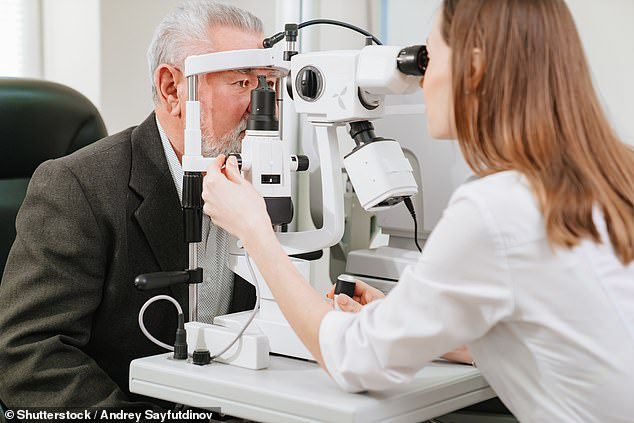Dementia cases could be reduced simply by correcting vision problems with surgery, glasses or contact lenses, scientists say.
This disorder ruins the lives of millions of people around the world, slowly robbing them of their memories and their independence.
But around 40 per cent of dementia cases are thought to be preventable, according to the NHS.
Previous research shows that preventing hearing loss, treating depression and getting plenty of exercise are ways to reduce your risk.
Now, scientists at Johns Hopkins University in the US say that addressing vision problems could also prevent a fifth of cases.
According to the NHS, it is believed that around 40 per cent of dementia cases are preventable.
The researchers used data collected annually from a study of U.S. adults aged 65 and older and included 2,767 participants eligible for visual and cognitive testing.
The researchers used the strength of the association between visual impairment and dementia to calculate the proportion of dementia cases that could be attributed to three types of visual impairment.
Using the data, they estimated that 19 percent of dementia diagnoses in people over age 71 were attributed to at least one visual impairment (nearsightedness, farsightedness, or the ability to see small objects sharply and clearly).
Since vision loss can also be caused by diabetes, the researchers took this into account in their analysis.
In 15 percent of dementia cases attributed to vision loss, the problem was a difficulty seeing very small objects, medically known as contrast sensitivity.

The researchers used data collected annually from a study of U.S. adults aged 65 and older and included 2,767 participants eligible for cognitive and vision testing.
Impaired contrast sensitivity occurs in several eye diseases, most commonly in cataracts, where the lens, a small clear disk inside the eye, develops cloudy spots.
It can be addressed by cataract removal, a surgical procedure associated with a nearly three percent decrease in the risk of dementia among older adults, according to the study authors.
In other cases, “best corrected vision” should be offered in the form of prescriptions for glasses or lenses to “influence visual performance.”
The findings come after hearing loss was ranked first among 12 modifiable risk factors for the global burden of dementia in the 2020 report of the Lancet Commission on Dementia.
According to the Alzheimer’s Society, not being able to understand sounds and speech could cause the brain to work harder.
The charity explains that this extra effort could lead to changes in the brain that affect our memory and thinking ability.
Visual impairment was not among the major modifiable factors for dementia in the Lancet report.
However, experts say that like hearing, vision is a “sensory stimulus” and without it we may be less likely to engage in activities that protect us against dementia, including socialising.
Professor Eef Hogervorst of Loughborough University, who was not involved in the study, told The Guardian that as well as being deprived of activity, vision loss could cause dementia because people who use their eyes less have reduced blood flow to the brain.
Meanwhile, Professor Gill Livingston, a dementia physician at University College London, said brain stimulation was key to keeping the brain fit.
“Things that make it harder for your brain to stimulate, like vision loss and hearing loss, mean you get less cognitive stimulation,” he said. The self.
There are currently an estimated 982,000 people living with dementia in the UK and this figure is expected to rise to 1.4 million by 2040.
An estimated 6.7 million Americans age 65 and older are currently living with Alzheimer’s dementia.
This figure could rise to 13.8 million by 2060.
Alzheimer’s disease is the most common type of dementia, affecting 50 to 75 percent of people diagnosed.


